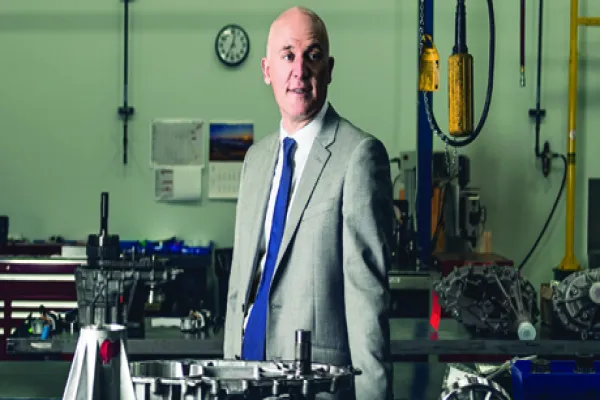What happens in Vegas doesn’t always stay in Vegas. Just ask Scott Miller, who worked ten weeks last summer in Sin City at casino and hotel operator Caesars Entertainment Corp. as a member of EDF Climate Corps, a fellowship program created by the New York–based Environmental Defense Fund that places graduate students in companies, universities and cities to help them find energy and cost savings. Miller’s exploits were featured this spring in an episode of Showtime’s Years of Living Dangerously climate change documentary series.
“My first day, as the cameras rolled, I was brought out to a balcony at Caesars Palace looking out across the Las Vegas Strip to the Flamingo hotel, which Caesars also owns,” recalls Miller, who spent more than ten years on Wall Street in finance jobs before shifting careers and completing a master’s degree in sustainability management from Columbia University. “My supervisor was talking about some problems they were experiencing with the LED lighting on the façade of the Flamingo, and I immediately went into research mode: Why is that? Oh, yeah, it was my job to figure that out.”
Miller’s eagerness and enthusiasm are not unusual among EDF Climate Corps fellows. “I was very excited to participate in the program,” says Brendan Edgerton, a joint-degree student at the Yale School of Management and the Yale School of Forestry & Environmental Studies. Edgerton spent last summer working at Office Depot’s corporate headquarters in Boca Raton, Florida, and was also featured in the Years of Living Dangerously series.
Edgerton and Miller were part of a 116-person army of EDF Climate Corps fellows that fanned out across the U.S. last summer, chosen from a pool of more than 500 applicants. “We’re looking for students with five to seven years of professional experience and strong leadership skills,” says Boston-based EDF managing director Victoria Mills, who heads up the program. “They need to be able to navigate large organizations and talk to everybody from the CEO to the janitor.”
Climate Corps is the brainchild of Gwen Ruta, vice president of programs at EDF who previously oversaw the nonprofit’s corporate partnerships. In the mid-2000s Ruta and her team worked with Wal-Mart Stores to help reduce the greenhouse gas emissions from its own operations and from its suppliers, enabling the retail giant to save millions of dollars in the process. They wondered why other companies weren’t pursuing similar initiatives. “It wasn’t a technology issue or an environmental issue,” says Mills, who joined EDF in 1997. “It was something much more mundane. Companies had organizational silos and misaligned incentives. We thought, ‘Why not throw some bright young business students at the situation?’”
In the summer of 2008, EDF placed its first seven students in companies in California, including Cisco Systems, Intuit and Salesforce.com. The students found a total of $35 million in potential energy savings. Six years later, EDF has had more than 500 Climate Corps fellows — including this summer’s 117 — and identified nearly $1.3 billion in energy cost reductions, enough to avoid yearly carbon emissions equivalent to those produced by 260,000 automobiles.
“We believe that the first thing to do is to squeeze out as much efficiency as you can,” says Yalmaz Siddiqui, director of environmental strategy at Office Depot. “As you become more efficient, you save money.”
Office Depot has long been a leader when it comes to energy efficiency. The retailer has cut its carbon dioxide emissions by 43 percent over the past decade, retrofitting its stores and other facilities with more efficient lighting, heating, ventilation and air conditioning and installing energy management systems. “They’ve already gone after a lot of the low-hanging fruit,” says EDF Climate Corps fellow Edgerton, who had met the Years of Living Dangerously producers and film crew even before he met Siddiqui, his manager at Office Depot.
Edgerton was tasked with coming up with a plan for the retailer to become carbon neutral by 2030. His experience working as a project manager at a Venice Beach, California, company doing LEED (Leadership in Energy and Environmental Design) certification for building projects prior to Yale was helpful, as was the weeklong boot camp that EDF holds each spring for its Climate Corps fellows. Edgerton identified a variety of projects across Office Depot’s stores, distribution centers and headquarters that could reduce electricity consumption by more than 32 million kilowatt hours a year and net the company more than $6 million in cumulative cost savings.
“The narrative about climate change has mostly been about the downside, the risk and the dangers, and not enough about the savings potential for energy-using businesses,” says Siddiqui. “Companies should instead look at the economic gains by choosing to do the right things from an efficiency standpoint.”
Get more on macro.
Follow II editor Michael Peltz on Twitter at @mppeltz.





